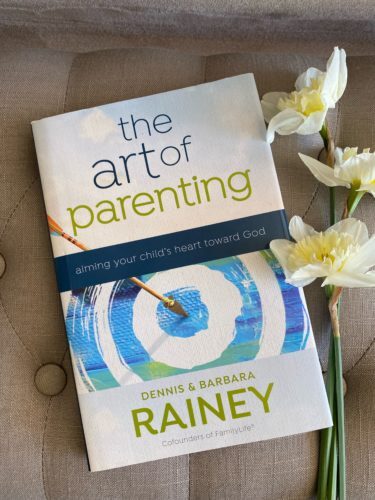Barbara Rainey's Blog, page 6
December 4, 2023
Does Your Marriage Feel Hopeless?


I have only flown first-class twice, and in neither case did I pay for the premium seats. I was bumped one time because I was flying with someone who was a diamond/platinum/other-fancy-metal frequent flyer, and the other time because my wife, Stephanie, was pregnant. I won’t pay for these upgraded seats for two reasons—I’m too cheap, and they don’t get me to my destination any quicker. But I can say that flying first class was pretty awesome, especially on the flight that was 3+ hours.
I think a lot of people might say they expected (or currently expect) marriage to be like flying first class. I know that I have felt that way. And Stephanie and I actually started our relationship in first class. It was easy, comfortable, and relaxing. We couldn’t understand why so many people were jumping out of the plane, or yelling at each other back in the coach section. A lot of people appeared to be miserable with each other, and we couldn’t understand why. Life was great for us, until it wasn’t.
When our hopes and dreams came crashing down, we quickly realized why so many people gave up on marriage. We lost hope. We felt at odds with one another. We were asking questions like, “Are we right for each other?” and, “Now what do we do?”.
Marriage is really really hard. And it was so much harder when we expected it to be a comfy seat in first class on a plane from life on earth to life in heaven. This expectation leads to a lot of disappointment and feelings of hopelessness. There are many things we need to keep pushing forward in life and marriage, but we cannot live very long without hope.
Hope is a funny thing (or “a dangerous thing” as Red puts it in the movie The Shawshank Redemption. What we often define as “hope” is probably more in line with fantasy or blind optimism than it is the hope that we see described in the Bible. There are two words in the Hebrew language that translate to the English word “hope.” Both of these words (“yakhal” and “qavah”) have to do with the concept of waiting.
To hope is to wait. To hold the tension (“qavah”) of what is not yet here but is close. To anticipate (“yakhal”) the glory of what is to come. The best marriages I know are those that place their hope on the only One who can handle all of it. All the pain, losses, unfulfilled desires, and every longing. That person is not your spouse, and you are not that person for your spouse.

We need hope
As I write this, it is the middle of December. It’s the church season of advent. I love the four weeks of advent because it is the closest experience of hope that I have all year. Yes, Christmas morning is great with presents, surprises, and joyful kids (mostly). But that is just a small part of the hope that comes from this season.
We hope (wait) expectantly for Christmas morning. To celebrate Jesus’ birth, and to anticipate His second coming. Hope without this sense of anticipation of what truly is to come is nothing more than a cheap fantasy that we can have all our desires met here on earth.
You might feel hopeless in marriage because you’re not really engaged with hope.
When Stephanie disappoints, hurts, or offends me, it is a reminder that she is not my savior. Whether she knows it consciously or not, she often reminds me of my need for a savior. And to be honest, I don’t respond well very often. I feel anger and resentment when she gets in my way and doesn’t fulfill all of my needs. One of the best gifts I can give to her is to not punish, retaliate, or rule over her when she hurts or disappoints me.
Over more than 20 years of marriage, one of the most comforting experiences of my life is the two of us waking up day after day aimed at doing better than the day before. But it wasn’t always that way. We’ve had to fight hard to develop that kind of relationship. We’ve done a lot of work together, and there is still more to do.
Relationships need attention
When I am at work, I often hear, “I just want to be happy and live in peace” when asking people what they desire in their marriages. Generally this is a reaction to the growing disconnect and conflict that exists between husband and wife. However, when you don’t do both maintenance and repair work on the relationship, it will decay and break down. This is a truth of the material world as much as it is for relationship the relational world. Relationships don’t survive without attention.
Cleaning up and fixing something that has been neglected for a long time takes more energy and effort than the time it would have taken to maintain it. In relationships, if you do not spend the time proactively working and engaging the faulty issues in your marriage, when it comes time to “fix it” it’s going to feel overwhelming. Perhaps even hopeless.
This overwhelming feeling, coupled with the everyday needs and demands of life, make it even more difficult to find the courage, energy, and hope to dig out of the mess. If you’re at this place of hopelessness in your marriage, consider these questions as a starting place to begin the repair:
Who is the subject of your hope?What are you waiting for?How are you handling the tension of your hopeful waiting?How can you help serve the hopelessness your spouse might be feeling?

Bringing hope back
If your hope is based upon your spouse becoming what you want or who you want them to be, consider redirecting your hope to God. Marriage counseling with a professional can be a great way to explore the specific repairs that your relationship needs. If you’re unable to meet with someone, consider these suggestions as a place to begin.
Ready to get started bringing hope back into your marriage?:
Do go on regular dates with your spouse.Do monthly budget meetings to review and plan financial concerns and needs.Do yearly/bi-yearly marriage enrichment activities (counseling, retreats, etc.).Do something together that you are both passionate about.Do tell your spouse what you like, love, and admire about them.Do keep your screens (television, phone, computer, tablet) turned off at least two nights per week after 8 p.m.Do practice non-sexual touch without it leading to sex.Do not blame your spouse for anything, ever. Own your actions. Let God deal with your spouse’s actions.Do not use the word “divorce” unless you are filing.Do not let your life become consumed with work, alcohol, social media, video games, food, or the TV.Do not hide behind your kids’ activities to avoid conflict.Do not use your kids to fulfill your loneliness.Reflections from Psalm 40
While these suggestions are all key principles for a healthy marriage, they won’t matter much if your hope is not in its proper place.
I have been reading Psalm 40 quite a lot over the last six months as I engage in my own process of waiting. Lately I’ve been reading it by half-verse. It’s made me wonder how long this process of waiting and response took for David. I’m guessing a lot longer than he wanted, and a lot shorter than it could have been! In closing, here are some reflections and wonderings for you about this passage on hoping and waiting for God:
Psalm 40:1a: “I waited patiently for the Lord”
Just sit with this part of the verse for a moment. Wait with this verse. David waited patiently. With hope. With anticipation. With faith that God would indeed come. And he does. And I wonder: What are you waiting patiently for?
Psalm 40:1b: “He turned to me and heard my cry.”
God turned towards David and heard his plea for help. The first act from God is to hear. To turn towards. At this point, David is probably still waiting patiently for something to be done even though God has already done something by turning towards David and hearing him. And I wonder: How have you missed God turning towards you and hearing your cry of help?
Psalm 40:2a: “He lifted me out of the slimy pit, out of the mud and mire”
God acted again, probably beyond what David hoped for. He lifted David out of the mess, but the mess was still there. And I wonder: What mess is God lifting you out of that you need to clean up?
Psalm 40:2b: “he set my feet on a rock and gave me a firm place to stand.”
God has now acted three distinct ways in response to David’s plea for help. He gave David stability on the rock when he had none for himself. This firm place gave David the ability to not worry about where he was standing so that he could attend to more important matters. And I wonder: What rock has God set your feet on?
Psalm 40:3a: “He put a new song in my mouth, a hymn of praise to our God.”
In this fourth act from God (4!) we see the focus change from God and David to David and his relationship with his community, his people. A hymn of praise to our God suggests that others will benefit and join in with David. And I wonder: Who needs to hear the new song God has given you and what you’ve been waiting for?
Psalm 40:3b: “Many will see and fear the Lord and put their trust in Him.”
A new song of praise for what God has done in David’s life will turn the hearts of many towards God. David had to ask, wait patiently, let God do the work only God could do, and then go and tell others about this work. The result? More people with more new songs to sing. And I wonder: Who around you is singing new songs to point you towards faith in and fear of God?
In the end, I believe we will all have to answer a question like this from God: “How was it for you hoping and waiting for me?”
With your request, God’s help, and your faithfulness to respond, no relationship is beyond repair. I have seen couples dealing with multiple layers of betrayal, lies, and brokenness work minor miracles on healing their relationship. On your wedding day, your spouse the right one for you. Don’t buy into the lie that there is someone better out there for you. If you’re willing to do the hard work, your hope can be restored.
The post Does Your Marriage Feel Hopeless? appeared first on Ever Thine Home.
November 20, 2023
13 Great Ideas for Practicing Gratitude During Thanksgiving and Year-Round
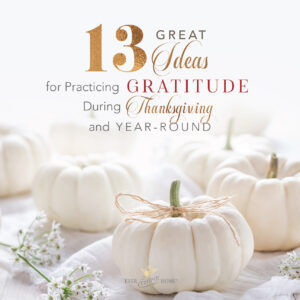
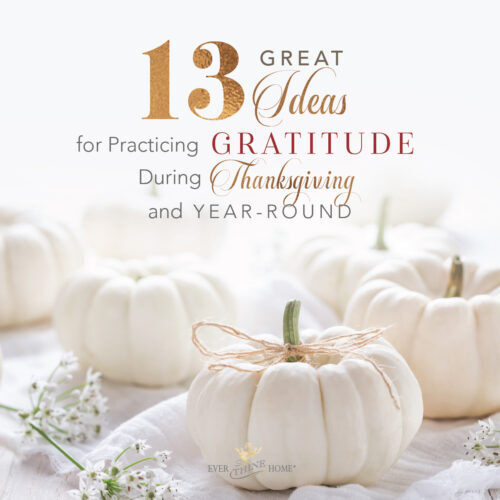
The more I learn about, think about, and practice gratitude, the more I realize it is one of the best ways of demonstrating our faith in God. Thanksgiving week provides an opportunity to teach your children about the value of showing gratitude as a way of life—all year long.
1 Thessalonians 5:18 tells us to “give thanks in all circumstances; for this is the will of God in Christ Jesus.” Gratitude is a mindset to be cultivated and grown. The more you focus on gratitude, the more you truly desire to give thanks in all things, the more it becomes a practiced way of life every day.

Here are some ideas for helping you and your family cultivate and train your hearts and minds to be more grateful: two new resources from our Etsy store, five Thanksgiving crafts for kids (from my friend Janel Breitenstein), and then six ideas for practicing gratitude every week.
Ready to grow in gratitude this season?
Two new Thanksgiving resources from the Ever Thine Home Etsy store:
I promised my family that I would create a shorter version of my book, Thanksgiving, A Time to Remember, which tells the story of the Pilgrims and the first Thanksgiving. So this year we present a 10-15 minute version that can be downloaded and read on a tablet. You can also print hard copies, which is what I’m doing for our family this year. Reading the story of the Pilgrims every year at Thanksgiving encourages gratitude both for all they sacrificed and for all the benefits we enjoy today. I hope this shorter version makes it easier for your family to add this reading tradition to your Thanksgiving Day every year. You can find the ebook here.2. Another new item in our Etsy store is a template for a “gratitude tree.” This is a really fun way to get your whole family involved in writing down what you are grateful for! The leaf template is easy to print at home and then add to a branch from your yard or a cutout tree from construction paper.
Use this leaf template to create your own gratitude tree! You can cut as many leaves as you want and have each family member write what they are thankful for each day. Punch a hole in the leaves and tie a string on to hang them, or simply use tape or glue to hang each leaf.
These are just two of our Thanksgiving resources in our Etsy store. You can find all of them here.
5 Easy Crafts to Encourage Your Children to Be Grateful on Thanksgiving, b y Janel Breitenstein
Create a paper chain to countdown to Thanksgiving. As the links are removed each day, kids can write something new for which they’re thankful. Keep the slips in a jar and have them read random selections at Thanksgiving dinner.Craft thank-you cards together to send to meaningful people in their lives. Use a 3-D material, like felt or craft foam, to add excitement and sensory interest for younger children. Or use vibrant colors clipped from magazines to form the feathers of a funky turkey on the card front.Create a “Give Thanks” banner and hang it in your home to remind your whole family to give thanks during this season. You could even encourage each family member to write specific things they are grateful for on the back of each letter. Click here for a free download.Use construction paper to cut brightly colored turkey feathers large enough for children to write on. Then, let your children write things for which they’re thankful (help younger children write their thanks), or Bible verses on thankfulness they find from the Psalms. Finally, let them hide the feathers all over the house for a few days of extended gratitude as the feathers are found and read aloud.One harsh winter, early pilgrims had to survive on only five kernels of corn a day! Hand a child five kernels of corn and discuss what this must have been like. Gently explain how easy it is for us all to complain … but simple reminders can encourage us to turn complaining into thanks, trusting God even when it is hard to see good things. Let your child glue the kernels in a row on plain cardstock. If you want, provide a few verses from which they can choose, writing one beneath the kernels. Then frame the dried creation simply and display it in their room.6 Ideas for Practicing Gratitude Throughout the Year
During dinner, every day, see if your family can collectively think of 10 things you are grateful for. Keep a running list or make a new list each night. You’ll be surprised how transformational this practice will be for your family.Type out a few texts, emails or even a handwritten thank-you note to express gratitude to someone who you appreciate and value once a week. This would be good for kids, too, even though they’ll likely complain initially! Or write a thank-you letter or email to someone in your past who had a significant influence in your life. Perhaps a high school coach or teacher, or a small-group leader, or a friend or relative who did something special for you.Read aloud a Psalm of thanksgiving to your family every day before school or during dinner. Here are a few: Psalms 89, 92, 95, 100, and 111. Start the habit of genuinely thanking people who help and serve you throughout the day: the librarian, the cashier, the waitress, the janitor in the restroom, the Sunday School teacher, even airport security agents. And whenever possible, make sure your children see you do it. Dennis started thanking airport security workers a few years ago, and watching him has motivated me to notice the many people in service jobs who are usually overlooked. Thanking them is actually fun! They are often genuinely surprised and smile in return.On the back of an interior door, post a piece of poster board and keep a pen attached with adhesive Velcro. Make it a family goal to fill the poster with drawings of things you are grateful for. Or start a “blessings journal” for yourself and for your family. Make it a goal to write and remember at least one way God blesses you each the day. Even recognizing God in ordinary things like seeing a rainbow or watching your toddler’s admiration for a caterpillar is evidence of God at work.Write a list of circumstances in your life that concern you. Then thank God for each item on the list knowing that you are obeying the command to “Give thanks in all circumstances.”

Gratitude is contagious. The more you cultivate it in your life—not only during Thanksgiving week but the remainder of the year as well—the more you’ll see others follow your lead!
The post 13 Great Ideas for Practicing Gratitude During Thanksgiving and Year-Round first appeared on Ever Thine Home.
The post 13 Great Ideas for Practicing Gratitude During Thanksgiving and Year-Round appeared first on Ever Thine Home.
October 30, 2023
Do You Know About All Saints’ Day?


I’ve long had mixed feelings about Halloween. Yes, it’s a fun family time—especially for kids—to dress up in costumes and celebrate the fall. But in our present culture it has also become a strange celebration of horror and death … to the point where sometimes you want to turn your kids’ eyes away from the grisly costumes and decorations.
But in recent years I’ve learned more about the day after Halloween—and that’s a day worthy of our attention and our celebration.
That day is All Saints’ Day. It falls on November 1 and is meant to show gratitude to God for those believers who have gone before us. Though All Saints’ Day is not a public holiday in America, it is in many other countries.
I’d love to see more followers of Christ take advantage of this special day to remember the saints who have influenced our faith.

When we hear the word “saint,” many of us may think of people honored by the Catholic church because of their remarkable faith and works. Catholic saints are believed to have performed at least one “miracle” during their ministry.
But the Bible uses the word “saints” to describe Christians in general—those who have been saved by the blood of Christ and set apart for the sake of the gospel. 1 Peter 2:9 provides a good description: “But you are a chosen race, a royal priesthood, a holy nation, a people for his own possession, that you may proclaim the excellencies of him who called you out of darkness into his marvelous light.”
So, all of us who are born again—alive or dead—are “saints.” All Saints Day is an opportunity for saints who are alive to celebrate those saints who have touched our lives … and I think that’s a good tradition.
All Saints’ Day is a great time to tell stories. Who are some of your favorite heroes from the Bible? Who are some saints whose lives have challenged and influenced you?
One of my favorite stories about a saint who lived long ago and influenced many people is about a young teenager named, Tarore (tah’-rah-reh), who lived among the Maori people in New Zealand. In 1835 the first missionaries arrived in New Zealand. Among them were Alfred and Charlotte Brown who left their homes and family to take the story of Jesus to people who had never heard. Soon after their arrival they began a mission school to teach the Maori children to read and write in their own language. One of the first students was Tarore the daughter of Ngakuku (nah-ku-kuh), a relative of a famous chief. She was a very bright student who quickly learned to read.
Tarore’s missionary friends gave her a copy of the Gospel of Luke. Tarore treasured her book and carried it safely around her neck in a straw purse. When she returned to her tribe every evening from school, she read the stories of Jesus to anyone who would listen. With fatherly pride, Ngakuku listened to his little girl reading and soon he believed that Jesus’ way to live was better than the rules of his tribe. He gave his life to Christ to follow His way forever.
But times were troubled in the land of the Maori. Fighting was an ongoing way of life among the tribes. The Browns realized they needed to move the mission school to a safer location, and some Maori children were allowed to go with them to continue their schooling. Led by Tarore’s father, the missionaries and the children caravanned to the new location, camping along the way at night.
One evening, their cooking fires attracted the attention of a neighboring tribe. Later, when all were sleeping, warriors crept toward them intending to kill the entire group.
But when a dog barked out a warning, everyone fled into the forest. All except 12-year-old Tarore, who did not hear the barking. She alone was killed by the warriors. One of them found her little book, the Gospel of Luke, in the purse she always carried, and though he had no idea what it was, he took it.
When Ngakuku found his daughter’s body, he was overwhelmed with grief. Before he found Jesus he would have demanded “utu”—the payment of a life for a life. This law of revenge was part of the Maori tradition. Yet in his sadness he remembered the words Tarore read from Jesus: “Love your enemies” (Matthew 5:44) and “Forgive and you will be forgiven” (Matthew 6:14).
Now Ngakuku knew revenge was not the way. He resisted his desire to seek retribution against the man who killed his daughter, for the higher call to love his enemies.
Meanwhile, the warrior who stole the little book was curious about its contents, so he found someone who taught him what it said. As he listened, he too believed the words of Jesus and felt great regret that he had helped kill Tarore.
He decided to ask for forgiveness. Walking a great distance and taking a great risk that he might be killed in revenge, this warrior found both Tarore’s father and the forgiveness he needed. Their story, along with other copies of the Bible, spread among the tribes leading many to choose the way of peace that Jesus taught. Even the greatest of their chiefs became a Christian and built a church for his people.
Today, in New Zealand over 175 years later, descendants of both the Maori tribes and the white settlers learn the story of Tarore in school. They learn that it was missionaries who brought Christianity to the native people, but it was the people themselves who shared the way of forgiveness with one another.
Stories about saints like Tarore enrich our walk with Christ and challenge us to walk in obedience to God’s Word. You can probably think of saints who have influenced your life; how about telling their stories to your family?

When I think of saints who have influenced me, I could talk about two women, Sally and Pam, who led me to Christ and helped me grow in my faith as a university student over 50 years ago.
I could talk about Bill and Vonette Bright, who founded Campus Crusade for Christ (now called Cru), the organization I’ve worked with ever since I graduated from college. And I could go back even further and talk about Henrietta Mears, the remarkable woman who showed Bill how to walk with Christ when he was a young man and then led his fiancée, Vonette, to the Lord. When I look back on my spiritual heritage, I can see a straight line from Henrietta Mears to Bill and Vonette Bright to Sally and Pam and me … and then on to anyone God has used me to influence over the last few decades.
I encourage you to use All Saints’ Day to broaden your knowledge of the saints who have come before us and then to tell stories to others. These stories are part of us because we are all part of the Body of Christ. One of my favorite hymns, “Crown Him Lord of All,” ends with this stanza:
O that with yonder sacred throng
We at His feet may fall.
We’ll join the everlasting song
And crown Him Lord of all.
I look forward to the day when I will fall at the feet of Jesus and join the blessed saints of old in that “everlasting song” of praise to Him. What a day that will be!
To help you celebrate All Saints’ Day, our team here at Ever Thine Home has created some cards for you to print at home . There are five saints included in the set of cards along with some blank cards on which you can glue a photo and write the name of one or more saints who have been influential in your walk with Christ. You could pass the cards out to your family during dinner, read the short description of each, and then talk about other saints who have influenced each of you.

If you enjoyed the story of Tarore, you can read more about her and several other saints in a short book called Tales of the Resistance . It’s a collection of stories about heroes of the faith who were able to resist sin and overcome circumstances to help share the good news of Jesus with others. We have a limited number of these books left and would love to get a copy into your hands. You can order both resources through our Etsy store .

The post Do You Know About All Saints’ Day? first appeared on Ever Thine Home.
The post Do You Know About All Saints’ Day? appeared first on Ever Thine Home.
October 16, 2023
3 Steps to New Purpose When Your Kids Leave the Nest
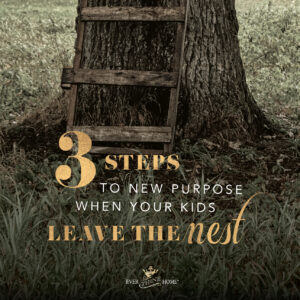
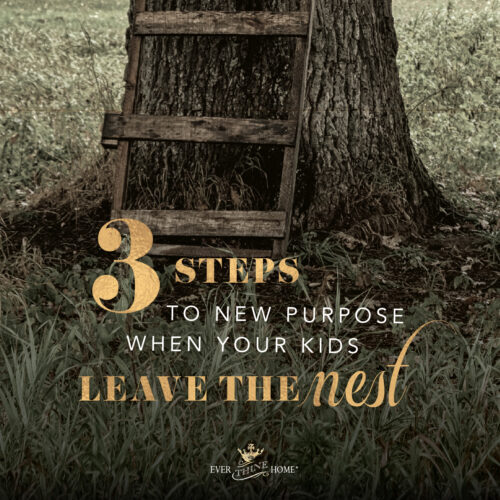
Tears streamed down Sarah’s face as she began to describe how she was feeling, “Our last child, Emily, has just left for college and I find myself crying almost every day. For 30 years I’ve poured my life into my kids. Even though I started two of my own companies and was very successful, my kids were always my priority. Now nobody really needs me. I feel like I’ve been fired. I am so lonely.”
Loneliness can catch us unaware. Georgie experienced it in the auto repair shop. As she was standing in line at the checkout counter, a song started playing over the intercom. It was one of her son’s favorites. In fact, his band had played it, and just hearing it brought back memories of all the nights of band practice in their basement.
To the astonishment of the clerk, Georgie burst into tears. Her son had only been gone two months and her heart was still tender.
Nancy felt the loneliness most at the dinner table. Her husband and daughter used to joke around and mealtimes were full of laughter. Now, conversation between her and her husband seemed forced, even boring. The cloud of loneliness was thick. And it wasn’t much fun to cook anymore.
Julia, a single parent, has raised her kids alone. Her daughter is a senior, and as they look at colleges, Julia wonders what the empty nest will be like for her. “One thing I’m realizing is that being a single parent has some hidden blessings,” she says. “I know I will experience loneliness in a fresh way when Liz leaves, but I am comfortable with being by myself. Feeling lonely because I miss my child is different from being miserable and being alone. And I’ve learned that if I’m too lonely, it’s my own fault. I need to reach out to someone else.”
At some level, each of us experiences loneliness during our years as a mother. And when our children leave home, the adjusting to the loneliness of the empty nest can be an especially difficult task.
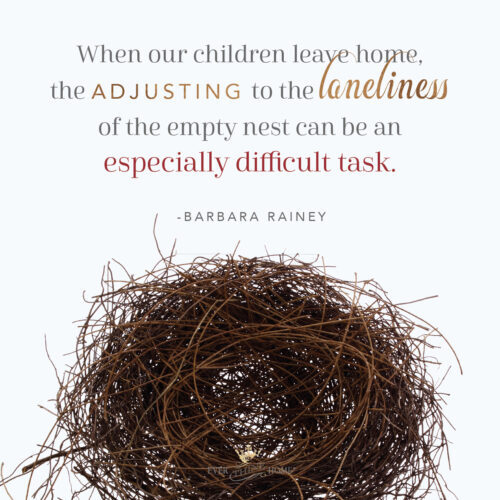
Three adjustments will help ease the pain of loneliness and give us a fresh perspective on what can become a grand adventure:
1. Recognize the “Season Principle.”
Over the years both of us have found it helpful to recognize that we go through different seasons in life. There’s the season of being single, of being a newlywed, of raising young children, and of parenting teens. And the empty nest season. And finally there are the golden years at the twilight of life.
Seasons aren’t purely biological; interspersed through life are seasons of loss, seasons of pain, seasons of stress, seasons of joy. It’s helpful to look at life in terms of seasons. Every season will have unique challenges and each season will have unique blessings. We all remember the challenges of the infant years: sleep deprivation and a lack of appreciation. It’s a rare four-year-old who says, “Mommy you are doing such a good job of raising me. Thank you!”
But those years also hold unique blessings. I (Susan) remember when Libby saw the ocean for the first time. As her little eyes grew wide with fright and amazement, she exclaimed, “Mommy, it’s too full. You need to let some of it out!”
It’s helpful to articulate the challenges and then choose to focus on the blessings of each distinct season. When we define the challenges and discuss them with others, we discover that we are normal! When we are intentional in looking for the blessings, we discover the joys that God has prepared for us. It’s important to remember that no season lasts forever. We want to really live in each unique time, and miss nothing.
So what about the season of the empty nest? We are already discovering some of the common challenges—that’s one of the purposes of this book. But we don’t want to remain stuck in the challenges. Instead, we want to focus on the benefits of this season. Yet, no matter what our current challenge is, the place to begin is with God.
2. Run to God.
At different times every one of us will get stuck. We’ll feel blue, we’ll experience loneliness, we’ll be anxious about the future. It isn’t just being in the empty nest; it’s being in transition. Moving from one season to another is uncomfortable and awkward. In fact, as much as we’d like to think stability is the norm in life, actually we spend more time in transition.
Where do we go in a time of transition? The book of Proverbs has a piece of advice for us: “The name of the Lord is a strong tower, the righteous run to it and are safe” (18:10).
Our inclination can be to run to our husbands, our mothers, even friends. We might try to hold onto our children in an unhealthy way—unhealthy for them and for us. Or our tendency can be to wallow in our loneliness. While others can be helpful, ultimately it is God alone who will offer comfort and help us move forward.
3. Find some friends.
A few years ago the two of us were attending a conference in Florida. When we finally had free time, we took a long walk on the beach with our friend Mary. As we walked, we began to ask each other, “What has been going on in your life? Is there a theme of the past year? What have you been thinking, learning, or struggling with?”
All three of us were in different phases of the empty nest. We were all busy with lots of acquaintances in our lives. Yet at the core, each of us felt lonely. We realized that what we longed for was to reconnect with some other women. In a way we felt we’d put deep female friendships on hold for several years as we focused on our kids.
It was now time to move out of that isolation and into community.
Joy had a similar experience. A mother of four and a well-known speaker, she had a meltdown when her last child left. She felt like her identity had just walked out the door. Even though she and her husband were unusually close, she knew he couldn’t really relate to how she was feeling. She needed some other women; they would understand.
Joy decided to be proactive. She called up 13 women she’d known off and on over the years, and together they went away for a weekend. Simply being able to share honestly what was going on in her life and listening to other women made her feel “not so stupid.” And it actually helped her feel normal again.

One of the great blessings of the empty nest is that we now have time to hang out with friends. If we are out of practice, it may be awkward at first, but take the plunge. There are rich relationships out there for you, and the joy that is waiting for you in “girl time” is amazing.
We’ve found it to be one of the best cures for loneliness.
Excerpted from Barbara and Susan’s Guide to the Empty Nest © by Barbara Rainey and Susan Yates. Used by permission of FamilyLife Publishing.
The post 3 Steps to New Purpose When Your Kids Leave the Nest first appeared on Ever Thine Home.
The post 3 Steps to New Purpose When Your Kids Leave the Nest appeared first on Ever Thine Home.
September 11, 2023
Six Tools to Rebuild Trust in Marriage

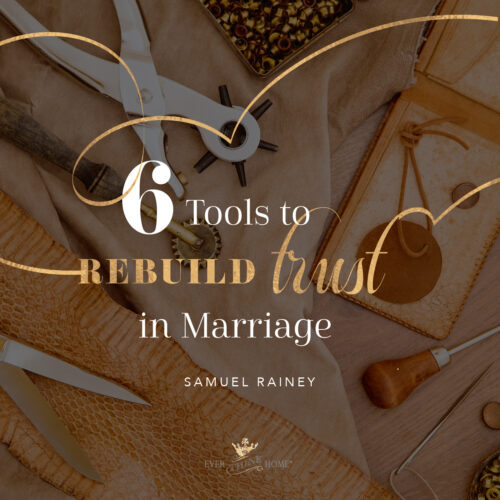
A Note from me:
When my son Samuel shared this six-part series with our team, there was some vying for which website would run it first, Ever Thine Home or The Raineys. As you can see, Ever Thine Home won our little team debate!
I am so happy to share Samuel’s first marriage tool with all of you. Samuel does a great job laying out common issues most marriages face and some very practical ways to deal with them over the rest of this week. I also want to encourage you and your friends to subscribe to Barbara’s Friends and Family so you can read all six! Plus all my new content slated for this fall.
Remember you can always enjoy a free week trial to get a chance to read all six tools plus check out everything I’ve done this year for Barbara’s Friends and Family .
Introduction
I’ve broken many bones in my body, but there was a stretch of three consecutive years when I broke an arm. If you’ve ever broken a bone you know that the healing process is neither fun nor fast. It’s painful, it takes time, and it usually requires the help of others. Yet when the healing is done well, the place where the break occurred will usually become the strongest part of the bone.
The problem with an incorrect healing process is that when the bone heals without an external aid, it ends up healing incorrectly. This is why my left pointer finger is crooked: I didn’t seek help when I broke it while wrestling with my boys over 15 years ago.
Like the bones in our body, a relationship cannot stand without the bones of trust. Unfortunately these bones get broken, just like those in our body. It’s painful when breaks occur in a relationship. Sometimes the healing process feels more painful than the break itself.
Most relationship issues I encounter in my counseling office are a result of broken trust. Stories like infidelity, workaholism, addictions, lying, gambling, and many other life changing situations. How we handle money is another common story of broken trust, and that’s why Rashad and Susanna called me.
They sat down on opposite ends of the couch, turned off their phones, and stared at me. After a moment of waiting to see if either of them would talk about why they were here, I asked how I could be of help. Susanna quickly took the opportunity to speak and over the next few minutes described the ups and downs of their 13-year marriage. She described how great they do together when they’re on vacation or away from the everyday stressors of their three kids and two dogs.
All of what she was saying sounded like pretty common marriage challenges, but I had a sense that there was something bigger concerning them. She finished her recap and looked at Rashad. He sharply asked her if that was all that she was going to share. Looking somewhat defeated, she said that he could share the rest.
“She’s a shopaholic, and has been lying to me about money for years,” he said. “We’ve been dealing with this issue for our entire marriage. She keeps promising she’ll stop, and just last week I found another credit card with over $11,000 of charges. I just can’t trust her anymore.”
Over the years, Rashad and Susanna had met several times with their pastor on this issue. But the problem persisted. Rashad would say, “How can I trust her if she keeps doing it?” To which she would respond, “I promise that I won’t do it again!”
One of the most beautiful, yet difficult, realities as followers of Jesus is that we are called to forgive others. Ephesians 4:32 says this, “Be kind and compassionate to one another, forgiving each other, just as in Christ God forgave you” (NIV).
Forgiveness is really hard to give when the behaviors of the other person don’t seem to be changing. Rashad and Susanna kept showing up week after week, and after almost a year of working together they were able to reconcile in a way that neither of them had experienced before. From my seat, there were two reasons they had this new experience of forgiveness.
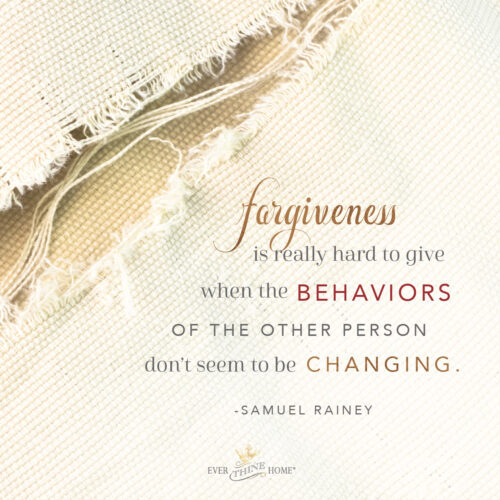
First, early on it became clear that Susanna’s way of coping with painful and stressful challenges in life was to shop. She realized that her shopping addiction started in college when her parents divorced and then declared bankruptcy. Identifying this helped Rashad to see that her lying and spending was not about her being a malicious person; she was reacting to a lot of pain. He found compassion for her, which helped to quiet his feelings of anger and resentment.
Second, Susanna worked really, really hard at following the plan we developed for rebuilding his trust. She didn’t do it perfectly. Yet over time she grew more able to get back on the plan. Rashad began to trust her more each day because he saw that she was truly putting in the work we had all agreed upon.
I heard a biblical scholar talk about how the Psalms follow a repetitive structure and process. There are Psalms of orientation, dis-orientation, and re-orientation. When tragedy happens in life, we get disoriented. Rebuilding trust in relationships is the process of reorientation. Discovering a new way to relate. So many people get caught up in trying to “get back to the way it used to be” thereby missing the opportunity to heal what’s been broken.
I’ve found that there are six specific tools that you need to rebuild trust. These tools can be done without the participation of the other person, they can be used on their own, or in the specific order I am going to lay them out.
The tools:
· Own your mistakes.
· Tell the truth.
· Delay gratification.
· Make amends.
· Follow through.
· Use your powers for good.
Each of these six tools are great to practice on their own. And you’ll probably experience growth in doing so. But combining all six together is like a trust-building super-tool. I’ve yet to see anyone utilize this super-tool and not find tremendous benefit in their life. When couples do this process together, it’s pretty amazing to see the transformation in their relationship.
Tool #1: Own Your Mistakes
“Why do you see the speck that is in your brother’s eye, but do not notice the log that is in your own eye? Or how can you say to your brother, ‘Let me take the speck out of your eye,’
when there is the log in your own eye? You hypocrite, first take the log out of your own eye, and then you will see clearly to take the speck out of your brother’s eye.”
~ Matthew 7:3-5 (NIV)
Owning your mistakes is the foundation upon which all the other tools rely on. It’s like learning how to do math—you first have to know the numbers before you can add and subtract.
Trust requires that you own your mistakes … admit them and take responsibility for them without blame. Without justification. Without explanation. Pure unadulterated ownership will breathe life and hope into a weary relationship.
This makes me wonder what Adam and Eve’s story would have looked like in Genesis chapter 3 had they owned up to their mistakes. After they sinned and ate of the forbidden fruit (verse 6) God finds them in the garden hiding and clothed in fig leaves (verse 9). He first addresses Adam and asks what happened (verse 11). Adam blames God and Eve for his sin, and only owns his mistake when Eve gives him the fruit (verse 12). Then God addresses Eve, and she follows Adam’s lead and blames the serpent for her mistake (verse 13).
I have no idea what God might have done if both of them were repentant and owned up to their sin. As a dad, I know that I still give consequences to my kids when they disobey, but it’s a far different relationship between us when they disobey and then take responsibility for their actions.
Perhaps Adam and Eve would have maintained a closer relationship with God had they not blamed and instead owned up to their actions. Regardless, their sin resulted in exile from the Garden of Eden and a new reality of pain and hardship because of their sin.
Like Adam and Eve, our inclination after a personal failure is to avoid responsibility, blame others, and shift the attention away from ourselves. This natural reaction breaks trust in others because they can’t rely on you to recognize and own the part you played in the failure.
One thing I’ve learned over the past 20 years working with people and their relationships: Everyone has light and darkness in them. This truth has been discussed in the Bible and by the great thinkers of every generation. Author and philosopher Alexander Solzhenitsyn said:
“The line separating good and evil passes not through states, nor between classes, nor between political parties either—but right through every human heart—and through all human hearts.”
The apostle Paul speaks to this truth in Romans 7 when he laments about doing what he hates and not doing what he wants to do (verse 15-20). We live by two laws: the law of the flesh (sin in us), and the law of God (Christ in us).
Owning your mistakes is shining a light on your darkness. This simple but difficult act proclaims that the story of Jesus conquering death and being raised to life is indeed true. That if Jesus came to be a light in the darkness (John 18:12), then it is our honor and privilege to participate with Him in allowing the light into the darkness. On the contrary, refusing to own your mistakes (blame, justification, ignoring, etc.) casts darkness over the light. This is the battle that you, me, and everyone on the planet is fighting.
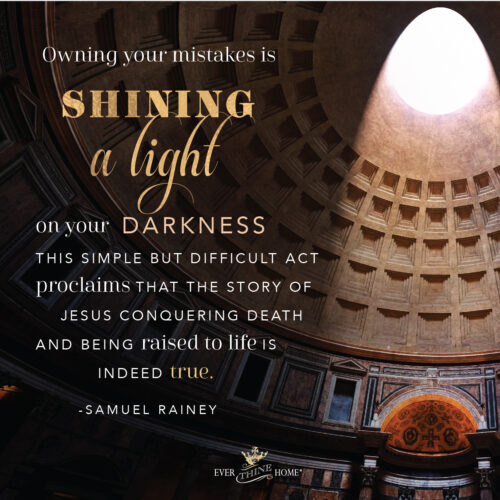
Step into the light. Take full responsibility for your actions as if they happened in a vacuum. For some amount of time, let your mistake be front and center in the relationship so that you can truly understand the impact your actions had on the other person.
Don’t try to explain the reasons for your failure. Don’t blame someone on why your mistake was not really your fault. Lastly, your intentions don’t matter (unless the other person, with curiosity, asks about why you did what you did).
Mastering the use of this tool will build your maturity. The benefit for others is that they will grow in their trust of your responsibility. They will know that you can and will handle the difficulties life brings your way. And when you mess up, they will trust you to own up to what you did. The cool benefit of this is that when you show yourself to be responsible as your primary action, grace and mercy are plentiful when mistakes happen.
Owning your mistakes …
Builds in you: Maturity
Helps others trust in your: Responsibility
Samuel Rainey, son of Barbara and Dennis Rainey, is a marriage and family therapist. He and his wife Stephanie have four kids.
The post Six Tools to Rebuild Trust in Marriage first appeared on Ever Thine Home.
The post Six Tools to Rebuild Trust in Marriage appeared first on Ever Thine Home.
August 14, 2023
Using Your Home for Influence


Establishing your home as an embassy of the King of Kings is probably much less complicated than you think. One of the easiest ways to use your home for influence is to invite people over for a meal.
One of my favorite stories is about Rosaria Champagne, who at one time was an English professor at Syracuse and an avowed lesbian. After the local newspaper published an article by Rosaria criticizing the Promise Keepers men’s movement, she received a number of responses—mostly negative—but one positive response stood out. It was a kind letter from a local pastor, Ken Smith, who asked some challenging questions about her philosophical foundations. Intrigued, she decided to call Smith and asked him questions like, “Are you an evangelical? What do you believe about the Bible?”
Finally Smith said, “Dr. Champagne, I think that question should be considered in front of our fireplace following one of my wife’s good dinners. How does that sound?”
Rosaria replied, “That sounds wonderful!”
Later she wrote, “I really wanted to see how Christians lived! I had never seen such a thing! … I was excited to meet a real born-again Christian and find out why he believed such silly ideas.”
A disarming dinner
She says the most memorable part of the evening was Ken’s prayer before they ate. “I had never heard anyone pray to God as if God cared, as if God listened, and as if God answered. … It was a private and honest utterance, and I felt as though I was treading on something real, something sincere.”
Thus began a friendship and conversation that lasted for two years and many more meetings at the Smith home. Eventually Rosaria committed her life to Christ, and a few years later when she married Kent Butterfield, Ken Smith walked her down the aisle. (For more about this great story, read Rosaria Butterfield’s book, Secret Thoughts of An Unlikely Convert.)
The Smiths recognized the special power of inviting people over for a meal. It gave them the opportunity to talk with and minister to people in a relaxed, nonthreatening setting. It’s a great way for people to see and experience God’s love in action. As 2 Corinthians 2:15 says, “For we are the aroma of Christ to God among those who are being saved and among those who are perishing.”

A hosting home
Another way to use your home for influence is to host small-group gatherings. If you belong to a small group at your church, for example, or if you are thinking of starting one, use your home as the base of your ministry. Or start a book club, a Bunko club, or a walking group with some neighbors like my daughter-in-law did. When it rained they did a workout in her garage. And I promise you their garage is not neat or clean! Everyone loved it.
Your home doesn’t need to look perfect—in fact it shouldn’t because real people live in messy houses, especially if you have kids. People will relax more when they see it’s not!
I remember when our six kids were little and a friend stopped by unannounced one day. For a few minutes I was mortified because the house was a disaster. Toys, laundry, and Cheerios everywhere. Later she told me she was so encouraged and felt so much better about her messy house because mine was too. A less-than-perfect home is a gift! It helps people relax.
Rob and Teresa were thinking “embassy” when they shopped for a new home. They wanted to use their home for community, especially for premarital mentoring with young couples. So the home they purchased had a large, open living room connected to the kitchen and dining area. Instead of meeting at a restaurant or coffee shop, each week of mentoring begins with a home-cooked meal in their home. The young couples find enrichment from the study but also from seeing them interact transparently in their home. Rob and Teresa have been a significant influence on dozens of young couples by the teaching and coaching, but also by the modeling of how to live your life in your home with others.
How do you know what direction is best for you and your family?
So much of it depends on what your interests and values are. Do you want your home to be the gathering place for your kids and their friends because you love students?
Do you find yourself drawn to the university culture? To faculty (like Rosaria in the story above), or international students who are lost in our American culture, or athletes or another student group?
Do you ache and long to help the marriages in your neighborhood or church or workplace?
Might God want to use you to befriend these people and make them feel the love of God in His embassy, your home?
Ask Him how He might use you and your family in His embassy! There are countless ways to love those around you in the setting of your home. God will guide you and show you who to welcome as He brings them your way.

May you experience the thrill of seeing God use you and your family as His ambassadors. There is nothing quite like it!
The post Using Your Home for Influence first appeared on Ever Thine Home.
The post Using Your Home for Influence appeared first on Ever Thine Home.
August 7, 2023
Did You Know Your Home Is an Embassy of the King?


Have you ever visited an American Embassy while traveling in a foreign country?
You can’t miss it: Old Glory flaps proudly in the overseas air. As you walk through the doors, George Washington, Abraham Lincoln, and other national hero paintings welcome you “home.” It’s familiar, and it’s also safe. Once on your embassy’s soil, you are governed by the laws of your home country.
If you are traveling, you head to the American Embassy for help; the staff are there to ensure American citizens are protected and cared for in a faraway land.
Did you know that your home is an embassy too?
In this weary and wavering world, Paul exhorts us, “Therefore, we are ambassadors for Christ, God making his appeal through us” (2 Corinthians 5:20). That isn’t just a command for when we’re in the workplace or out running errands. It’s a definition of who God has designed us to be. All the time. Everywhere. Even at home.
And that makes your home an embassy.
We belong to another realm, another place, another King.
Have you ever thought that your home may be one of your best opportunities to reach and influence people for Christ? So many people today are longing for a place where they are loved and encouraged. A place where they feel comfortable and not judged. Your home can be that place.

Yet too often most of us wait to invite others into our home until the right time … when the rooms are clean, a meal is ready, the children are well-behaved, or we have free time. But … remember … our homes do not belong to us. They are given to us by God to steward for His purposes. Instead of waiting for the right moment, we should expect God to use our homes, His embassy, to put Him on display in the dailyness of life to anyone who enters or comes near.
Though I am an American, I am first and foremost a follower of Jesus Christ, a child of the King. He wants to rule in my heart but also in my home, His outpost in this foreign land.
Just like the American Embassy waves the flag to declare safety and comfort within, we need signs and sounds and recipes and attitudes that declare our home is the King’s domain, an embassy of the King. When the UPS man delivers, when neighbors stroll by, when guests arrive at your home, what is your goal? Do you want them only to see inside only when things are perfect, or do you listen to your King’s voice reminding you who you belong to? Does your family belong to Yahweh? If yes, then your home is an embassy and He wants to use you and what He’s given you to make Him known.
Here are five ways to practically make your home His embassy:
1. Practice hospitality.
First, hospitality is not the same as entertaining. It is an attitude of welcoming, of having a purposeful open-door policy that invites others in as God leads.
Early church Christians felt so strongly about using our homes to provide a place of belonging that the Benedict of Narcissi made specific rules about the way visitors to the Benedictine Monastery would be treated. For example, every visitor was to be greeted in a way that displayed to him the gentleness of the reverence of God and the warmth of God’s love—a welcome that declared the visitor a gift from God. The porter was to say to every visitor, “We are so grateful God has brought you to us.”
How would you feel if you were greeted at a friend’s house that way?
The monks knew that the way we answer the door is the way we deal with the world. Walking across your home’s threshold, any guest and even your family should feel, “You’re in the household of God, made up of ordinary people who have been transformed by Jesus Christ.”
Friends of ours, Dave and Lida, empty nesters living in a four-bedroom home, keep their extra bedrooms clean and ready to be filled with whoever might need them. Dave and Lida heard of a patient who was traveling frequently to the local children’s hospital for specialized care, so they offered the patient and his family a free stay in their home for the duration of the treatments. It was a great gift of love and compassion for a little family dealing with big medical bills and stress.
2. Love your neighbors.
If you are like most others in America, you probably know only a few of your neighbors … and perhaps none of them. Research recently showed that most Americans (57 percent) say they know “only some” of their neighbors; 23 percent of those aged 18-29 and 15 of those between 30-49 said they knew none at all.
Instead of sitting in front of the TV after dinner, take a slow stroll down your street. Say hello to everyone you pass and look for opportunities to talk. Don’t hide behind your backyard fence. Let your kids play in the driveway and front yard too; invite the neighbor kids over to play in your yard. Trade lawn responsibilities when someone is out of town, collect mail, roll their trash can out to the curb.
One family hosted a cul-de-sac cookout when they moved into a new neighborhood. It was so much fun that their neighborhood continued with Bunco night, summer cookouts, Halloween game night, and even a carnival.
Loving our neighbors is often easier than we imagine. The possibilities are endless. Ask God to help you get to know those He has planted near your home, His embassy.
3. Keep an open-door policy for anyone who needs a listening ear.
I’m inspired by a woman I saw in an online video who calls her home an embassy. She says she is always prepared for anyone who might stop by. She sees her home as a hideaway any time of day or night for anyone in need.
Some friends and family call ahead to schedule their visits; others drop by unannounced when the day gets too long and too hard without the support of a friend. This woman declares that the drop-ins are the best because she knows the Holy Spirit sent them. Fully unprepared for these visits, she relies solely on the Holy Spirit’s leading as she listens and consoles her guests.
The question in our always busy fast-paced world is: Are we paying attention to our King who might be asking us to linger with someone who might need to talk even though we feel like we don’t have time? The story of the five loaves and two fish (John 6:1-14) reminds us that God has no trouble multiplying our time and our resources if we are living for and listening to Him.
4. Decorate with meaningful truth.
Deuteronomy 6:8-9 instructs believers to keep God’s words and commands ever before us: “You shall bind them as a sign on your hand, and they shall be as frontlets between your eyes. You shall write them on the doorposts of your house and on your gates.” For years I’ve encouraged people to apply these words by making the reality of Jesus visible in their home.
In our home embassy, I have several of my favorite verses framed and hanging in various places. I have ornaments with the names of Jesus hanging on lamp switches and on a nob on a drawer. My front door always has a plaque or a banner with a verse or a reference to the King who reigns in my life and my home. It’s not hard to find or make these visual declarations that Deuteronomy commands.
For more ideas, be sure to look at the Ever Thine Home Etsy store for digital prints, artwork, a beautiful “I Am” calendar, and more, including one of my favorite verses, Isaiah 33:6. If you don’t know what it says, go to the Etsy store and look for it! It’s been one of our top 10 bestsellers for a long time.
5. Host small-group gatherings.
Sure, your church, local coffee shop and community buildings have plenty of meeting space, but inviting friends into your home is far more welcoming. We learn more about our friends and others when we spend time with them in their space.
Next time you’re planning a gathering, birthday party, or family event, volunteer your home. It doesn’t mean you have to do all the work; you can delegate.
Your home is an embassy of the King.
There are countless ways to love those around you in the setting of your home. Even the smallest strides toward declaring your home a representation and refuge of our King will honor the One who has provided your family with a residence able to serve Him through serving others.

Adapted from an article on FamilyLife.com Used with permission.
Be sure to watch the inspiring video “The Embassy” at the website for Deidox Films —you can view if you open a free account.
The post Did You Know Your Home Is an Embassy of the King? first appeared on Ever Thine Home.
The post Did You Know Your Home Is an Embassy of the King? appeared first on Ever Thine Home.
June 26, 2023
Where Can We Find Stability in an Unstable Time?

In the current climate of our country I feel my stability—my sense of peace, my rootedness—is buffeted continually by news about political and social unrest, threats to national security, shocking crime, and even reports of extreme weather. A few weeks ago a devastating tornado swept through Little Rock, destroying areas I’ve driven through for over 40 years. Sometimes in our world today I feel as if my limbs are being stripped, my stability uprooted like the destroyed trees and buildings littered across these neighborhoods.
The future is unsure. We do not know what tomorrow may bring.
My comfortable and somewhat predictable routine brings me comfort. Every day I trust the walls and roof of my house to remain stable, the roads on which I drive to remain solid. Our medical system with its superior training, facilities, and staff have assured me that most any problem can be repaired. Our freedom to worship—a right we have counted on for over two centuries—has always felt as dependable as bedrock.
But the dark clouds on our world’s horizons are challenging my thinking about where my trust is placed. I wonder if my security and stability is resting too heavily on my circumstances.
In the midst of the 2008 economic crash in America, I found these words which stabilized my anxiety then, and again today: “And He will be the stability of your times” (Isaiah 33:6).
There is so much I cannot change or fix about this world. That will always be true. And so the rock of Christ, the anchor of my soul, must be my sure hope and my stability, not the predictable norms I long to cherish.

The eternal truth that God is sovereign is either true or it is not. I’m counting on its veracity because He brings more peace than any treaty or alliance of men possibly could.
As I read my Bible I read that hard times are part of life. And there are predictions of hard times ahead. At the end of the age, whether that is just around the corner or decades away, life will become more difficult, not easier. In this also He is the stability I desire, need, and long for.
No matter what happens, I pray you will join me in growing deeper roots into the only One who can make us safe. I also pray that we will make the transcendent truth of God and His Word more a part of our conversations so that others may also know of this hope and stability. Christians have become fearful as our culture that once supported us and our freedom to worship now is undercutting and overtly attacking many of us.
What if our land is ruined by a natural disaster? What if some foreign nation launches a missile that reaches our shores? Will you rest on God’s promises then?
Centuries-old trees, like sequoias and oaks, endure through drought and storms because when conditions are good they eagerly soak up nourishment and sink their roots deeper to prepare for the hard times that always come.
Will you sink your roots into the Rock of Christ?
Will you invite Him to be the stability of your times no matter what may come?
If this post helped you, you would also enjoy our new online video study titled, Cultivating Hope In Times of Hardship and Disappointment. This series, with five video messages and a free downloadable workbook, is a compilation of many of the lessons I’ve learned in my 50 years of following Jesus as His disciple.
In this study, I explore:
The story from John 11 of Mary and Martha and their disappointment with Jesus after the death of their brother Lazarus.8 ways to nurture faith and hope in the dark times of life.Keeping hope alive.If you are curious to learn more I’d love for you to watch the video series and learn more about cultivating hope when you’re going through hardships and are disappointed in God. It’s available now!
The post Where Can We Find Stability in an Unstable Time? appeared first on Ever Thine Home.
June 19, 2023
Using Chores to Teach Your Children the Value of Work

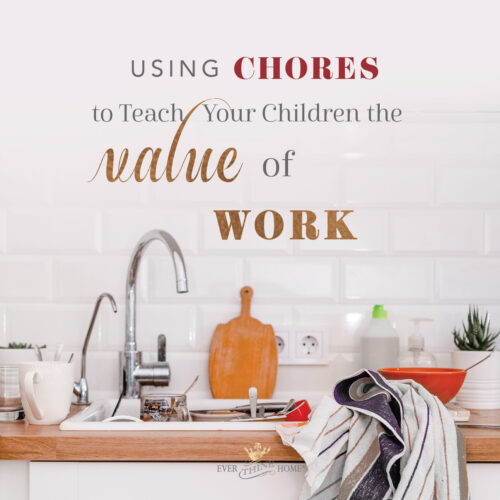
Early in our marriage, Dennis and I discovered we had very different views on the value of work. Then we had children … and the conversation widened to include questions like, “How do we balance play time and teaching time? How much can we expect of our toddlers, our preschoolers?”
Do you know what values motivate you? In those early parenting years Dennis and I made individual lists of what values mattered to each of us, what values we wanted to teach our children. Then we combined these into a single list we titled “What we want to teach our children.”
It wasn’t a simple or a quick conversation! As I wrote in my book, Letters to My Daughters, “Different ingredients don’t blend easily.” Over the years we modified the list as we remembered qualities or learned a truth from the Bible that we had to include. You can find that list here.
One of my contributions to our list was teaching our kids to value work as good. God put us in His creation to work with it, manage it, and steward it. All occupations that are needed in our world … from tech jobs to driving semi-trucks, to service jobs, parenting, ministry work, selling insurance or other products that make our lives better … all this work is good and can be a daily offering to God as we labor for His glory.
Our children worked from the time they were little. They loved helping me when they were old enough to carry things for mommy. Of course they made messes and it would have been easier if I had just completed these chores myself. But if we don’t introduce them to the joy of working when they are little it will be much harder when they are older. It’s not so hard to be an adult if you learn it slowly over the first 18 years of life.

Work is a holy calling. God declared in the Garden of Eden that Adam and Eve were to work for six days and rest on the seventh. And work isn’t optional either.
Here are some of the jobs our kids did and the ages when they began.
At age three they began to run little errands for me. Get mommy a diaper for the baby … take a pile of clothes (a manageable one for their size) to a sister’s room. I also gave them small jobs like emptying the silverware holder from the dishwasher into the drawer. It’s a great “matching things” exercise. And I let them carefully move eggs from the carton to the container for the refrigerator.My daughter, Rebecca, who went to culinary school, began teaching her twins to cut and chop foods at age three with child-safe knives.
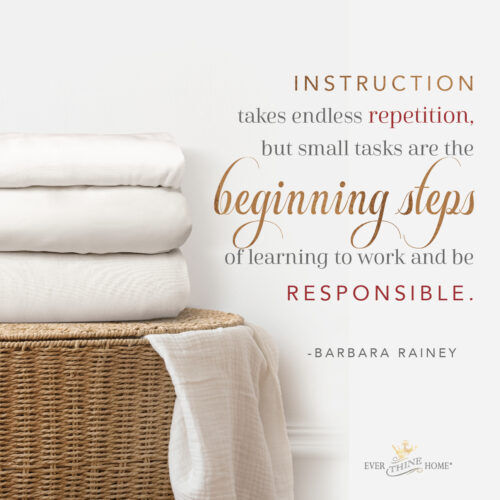
I made charts for years to help them see their progress and earn rewards. They learned to do things like rake leaves, help Dad with the mowing, wash and dry dishes, load the dishwasher, help with baby sister by reading her a book or getting her some toys. And any work I did around the house included teaching my children to do it, knowing one day they would be adults whose lives would include all of this kind of work. (See printable chore charts at the end of this post.)
Get your copy of The Art of Parenting here!
At age 14 we increased our kids’ allowances so they could begin to budget and learn to buy their own clothes. We had many interesting conversations as personal preferences came out. Like the time our son decided he wanted the hottest new tennis shoes. It was more than his entire monthly allowance, but he saved and bought them two months later. But it meant no new anything else.At 12-14, we also gave them the responsibility of doing all their own laundry. After paying for a brand-new pair of expensive jeans with their own cash, they were much more careful when washing them!Their personal tastes also made them realize they needed extra income. This motivated them to get jobs babysitting or mowing lawns. I remember Dennis telling our teens, “You are becoming an adult and we are not responsible to satisfy your adult tastes.” Learning to stretch their dollars was valuable training for their futures.
Then we let them work for others. It’s important to learn how to answer to a boss. One of our sons worked at 16 for a small construction company and learned to do roofing in the hot southern sun. It was the summer he became a man.Most of my kids are teaching their own kids to work too. And they’ve lowered the age level for some of these jobs, like laundry! I say, “Way to go!”
May you bravely raise up your children to be hard workers who are dependable and responsible. Life will be easier for them if you do.
Printable Chore Chart (for boys)
Printable Chore Chart (for girls)
You might also want to read, “50 Character Qualities We Hoped to Teach Our Children.”
The post Using Chores to Teach Your Children the Value of Work appeared first on Ever Thine Home.
June 12, 2023
Lies You May Believe About God: “If I Do My Part, God Will Answer My Prayers”


As a new Christian, and a few years later as a new wife, I eagerly prayed for everything. God graciously allowed me to see answers in those early years of faith because He knew I needed to see some evidence. Little children need much encouragement.
Without fully realizing it, I developed a formula. In all the Scriptures about prayer, I thought, there had to be a key, a secret to unlock the power of God. I was living my life with a reasonable, logical assumption about the Christian life. Here was my plan:
Do my best.Follow the rules—especially the Bible’s rules.Pray.Wait for God to bless my work and my efforts.And I just knew that, even if I didn’t do things perfectly, God would still give me what I desired that was good. Early in my Christian life I memorized Psalm 37:4, “Delight yourself in the Lord, and He will give you the desires of your heart.” I reasoned: God knows my heart and I want HIs best, therefore He will give me the desires of my heart, aka answered prayers.
I believed a common lie, that prayer is how we convince God to work on our behalf.
Over the next two decades prayer became more confusing than anything else in my Christian life. I read many books on prayer. I went to Bible studies and we rarely missed church. I spent a season or two fasting. I formed two prayer groups for moms. And I prayed with persistence like the woman in Scripture who pestered the unrighteous judge (Luke 18:1-8).
But in all of this spiritual effort it seemed He was deaf or had closed His ears to my begging pleas because:
Still our granddaughter died.Still our prodigal left home and pursued a destructive lifestyle.Still our daughter was date-raped.Still our son is physically handicapped.Still my heart was faulty for 40 years.Still cancer came uninvited.In all this and more I have experienced deep pain that felt impossible to bear, more times than I ever imagined I would.
Over time I learned that God’s silence to some of my prayers was His reply. I don’t have to understand. His inspired words provided comfort, answers, and hope. Romans 1:17 tells us, “The righteous shall live by faith.” And Psalm 46:10 reminds us to “Be still, and know that I am God.”
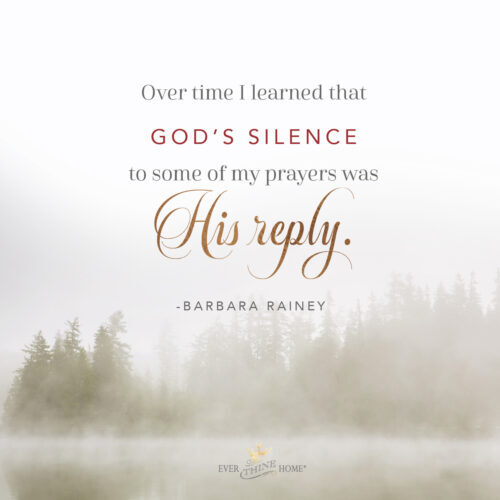
When I wrote on this topic a few years ago, one reader sent me a quote by Oswald Chambers from his classic devotional book, My Utmost for His Highest. “If we pray only because we want answers, we will become irritated and angry with God,” Chambers wrote. Have you felt that way? I sure have and Chambers is right. If our goal is checking off answers, adding up prayer victories, we are not seeking God for Himself, but for what He can do for us.
Oswald Chambers continues: “We are not here to prove that God answers prayer, but to be living trophies of God’s grace.” God is not a vending machine but a Father who wants a personal relationship with us. And for that to happen we must become more like Jesus, surrendered to His will which makes us “trophies of His grace.”
Today in the face of a long list of unanswered prayers I find comfort in knowing my Jesus understands because while on earth He felt what I have felt.
At the Garden of Gethsemane, the perfect Son—who had never entertained even one sinful thought, who had perfect communion with God the Father, who obeyed God’s will completely—was troubled because He knew He would soon be arrested, tried, and crucified. He prayed, “My Father, if it be possible, let this cup pass from me; nevertheless, not as I will, but as you will” (Matthew 26:39). He did this not once, but three times.
And God said nothing. NOTHING!
The answer was a silent no because God the Father had a higher good in mind.
And so He does with my life. Isaiah 55:9 tells me, “For as the heavens are higher than the earth, so are my ways higher than your ways and my thoughts than your thoughts.”
If I had found a key to prayer I would have depended on the formula, not on my Father. My desire today is to listen and follow the Holy Spirit’s lead all day every day as Jesus did. Jesus said He did nothing on His own initiative. To be more like Jesus is my goal. It’s taking decades.
God wants a relationship with me. It’s a headshaking truth I still can’t get over. But I know it’s true.

A real relationship demands that both individuals know each other. He knows me but I must learn to know Him. And so all my life God has been showing me Himself, not at all in the ways I might have expected or wanted, but by refusing to adhere only to what I imagined Him to be, I have discovered a God who is incomprehensible but oh, so personal.
And the greatest delight is how I love Him and treasure Him. I don’t need answers for the issues in my life; I don’t need to know why. I have Him. Even in the hard things yet to come He will be with me. He will be my stability.
I hang on to these beautiful words I love from Habakkuk 3:17-18:
Though the fig tree should not blossom,
nor fruit be on the vines,
[Though] the produce of the olive fail
and the fields yield no food,
[Though] the flock be cut off from the fold
And there be no herd in the stalls,
Yet I will rejoice in the Lord;
I will take joy in the God of my salvation.
Habbakuk resolved to trust God and rejoice in knowing Him even if every crop should fail leading to economic catastrophe and famine. And he asks us today to do the same.
Prayer still remains a mystery to me and I imagine it always will. Even though it’s an enigma I still talk to God a lot, more than in my younger years. I’m learning to watch for hints of His orchestrating hand and I’m giving thanks in everything because I believe He knows and is intimately involved in every detail of my life, even when I can’t see it.
One day all things will be made new. All will be made right. There will be no more tears or sorrow or loss.
Until that day, God asks that I surrender all to Him and trust Him as I live in this broken world that He is working all things for good, even when I can’t see or understand how or why.
This world is not our home!
If this post helped you, you would also enjoy our new online video study titled, Cultivating Hope In Times of Hardship and Disappointment . This series, with five video messages and a free downloadable workbook, is a compilation of many of the lessons I’ve learned in my 50 years of following Jesus as His disciple.
In this study I explore:
The story from John 11 of Mary and Martha and their disappointment with Jesus after the death of their brother Lazarus.8 ways to nurture faith and hope in the dark times of life.Keeping hope alive.If you are curious to learn more I’d love for you to watch the video series and learn more about cultivating hope when you’re going through hardships and are disappointed in God. It’s available now !
The post Lies You May Believe About God: “If I Do My Part, God Will Answer My Prayers” first appeared on Ever Thine Home.
The post Lies You May Believe About God: “If I Do My Part, God Will Answer My Prayers” appeared first on Ever Thine Home.
Barbara Rainey's Blog
- Barbara Rainey's profile
- 24 followers









